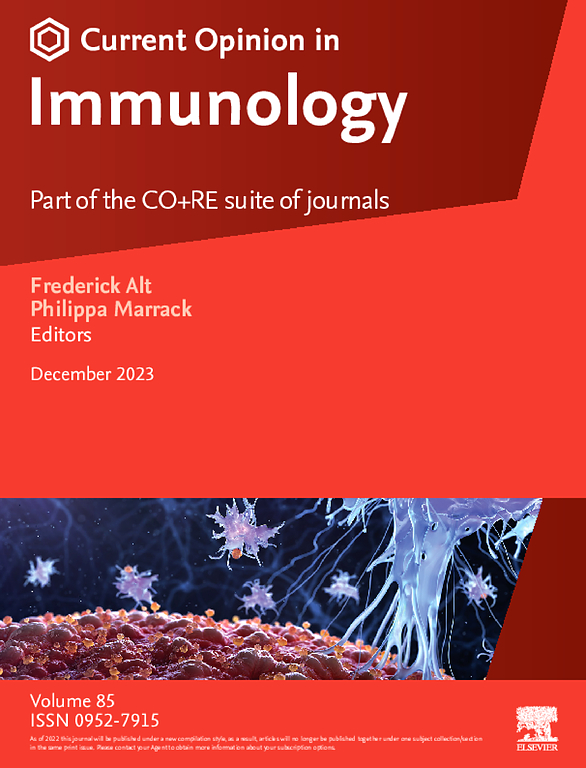优化移植后细胞疗法以增强移植物抗白血病在血液系统恶性肿瘤中的作用
IF 5.8
2区 医学
Q1 IMMUNOLOGY
引用次数: 0
摘要
同种异体造血细胞移植(HCT)可以治愈高危恶性血液病患者。供体T和自然杀伤(NK)细胞有助于移植物抗白血病(GVL)的影响,提供复发保护。hct后复发通常表现为GVL不足,但赋予GVL的同种异体反应性淋巴细胞也可能导致移植物抗宿主病(GVHD)。在这里,我们回顾了选择性地增加GVL同时最小化GVHD的最新进展。深入了解hct后T细胞功能障碍的独特机制,强调干预增强gvl介导的T细胞。早期临床数据表明,过继性转移工程化供体T细胞,表达特异性的次要组织相容性抗原的转基因T细胞受体,或表达与恶性细胞表面蛋白结合的嵌合抗原受体,可以减轻hct后复发。NK细胞是单倍体HCT后GVL的关键介质,可以诱导进入高度功能的记忆样状态,并给予HCT受体以增强GVL。这些创新有望改善hct后的结果。本文章由计算机程序翻译,如有差异,请以英文原文为准。
Optimizing post-transplantation cell therapies to enhance graft-versus-leukemia effects in hematological malignancies
Allogeneic hematopoietic cell transplantation (HCT) can cure patients with high-risk hematologic malignancies. Donor T and natural killer (NK) cells contribute to graft-versus-leukemia (GVL) effects that provide relapse protection. Post-HCT relapses often represent inadequate GVL, but alloreactive lymphocytes that confer GVL may also cause graft-versus-host-disease (GVHD). Here, we review recent developments to selectively augment GVL while minimizing GVHD. Insights into the unique mechanisms of post-HCT T cell dysfunction highlight interventions to enhance GVL-mediating T cells. Early clinical data suggest that adoptive transfer of engineered donor T cells, expressing either transgenic T cell receptors specific for minor histocompatibility antigens presented exclusively on recipient hematopoietic cells or chimeric antigen receptors binding surface proteins on malignant cells, can mitigate post-HCT relapse. NK cells, key GVL mediators after haploidentical HCT, can be induced into a highly functional memory-like state and administered to HCT recipients to enhance GVL. These innovations promise much-needed improvements in post-HCT outcomes.
求助全文
通过发布文献求助,成功后即可免费获取论文全文。
去求助
来源期刊
CiteScore
13.30
自引率
1.40%
发文量
94
审稿时长
67 days
期刊介绍:
Current Opinion in Immunology aims to stimulate scientifically grounded, interdisciplinary, multi-scale debate and exchange of ideas. It contains polished, concise and timely reviews and opinions, with particular emphasis on those articles published in the past two years. In addition to describing recent trends, the authors are encouraged to give their subjective opinion of the topics discussed.
In Current Opinion in Immunology we help the reader by providing in a systematic manner: 1. The views of experts on current advances in their field in a clear and readable form. 2. Evaluations of the most interesting papers, annotated by experts, from the great wealth of original publications.
Current Opinion in Immunology will serve as an invaluable source of information for researchers, lecturers, teachers, professionals, policy makers and students.
Current Opinion in Immunology builds on Elsevier''s reputation for excellence in scientific publishing and long-standing commitment to communicating reproducible biomedical research targeted at improving human health. It is a companion to the new Gold Open Access journal Current Research in Immunology and is part of the Current Opinion and Research(CO+RE) suite of journals. All CO+RE journals leverage the Current Opinion legacy-of editorial excellence, high-impact, and global reach-to ensure they are a widely read resource that is integral to scientists'' workflow.

 求助内容:
求助内容: 应助结果提醒方式:
应助结果提醒方式:


